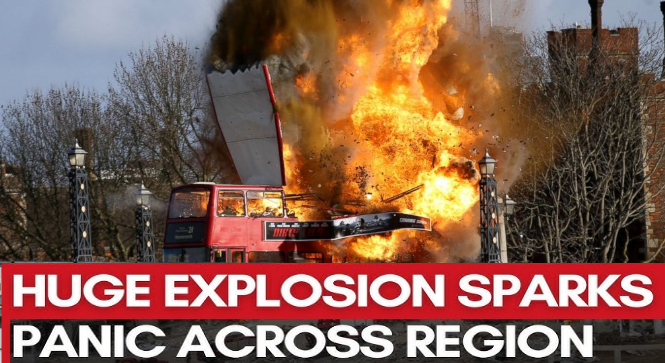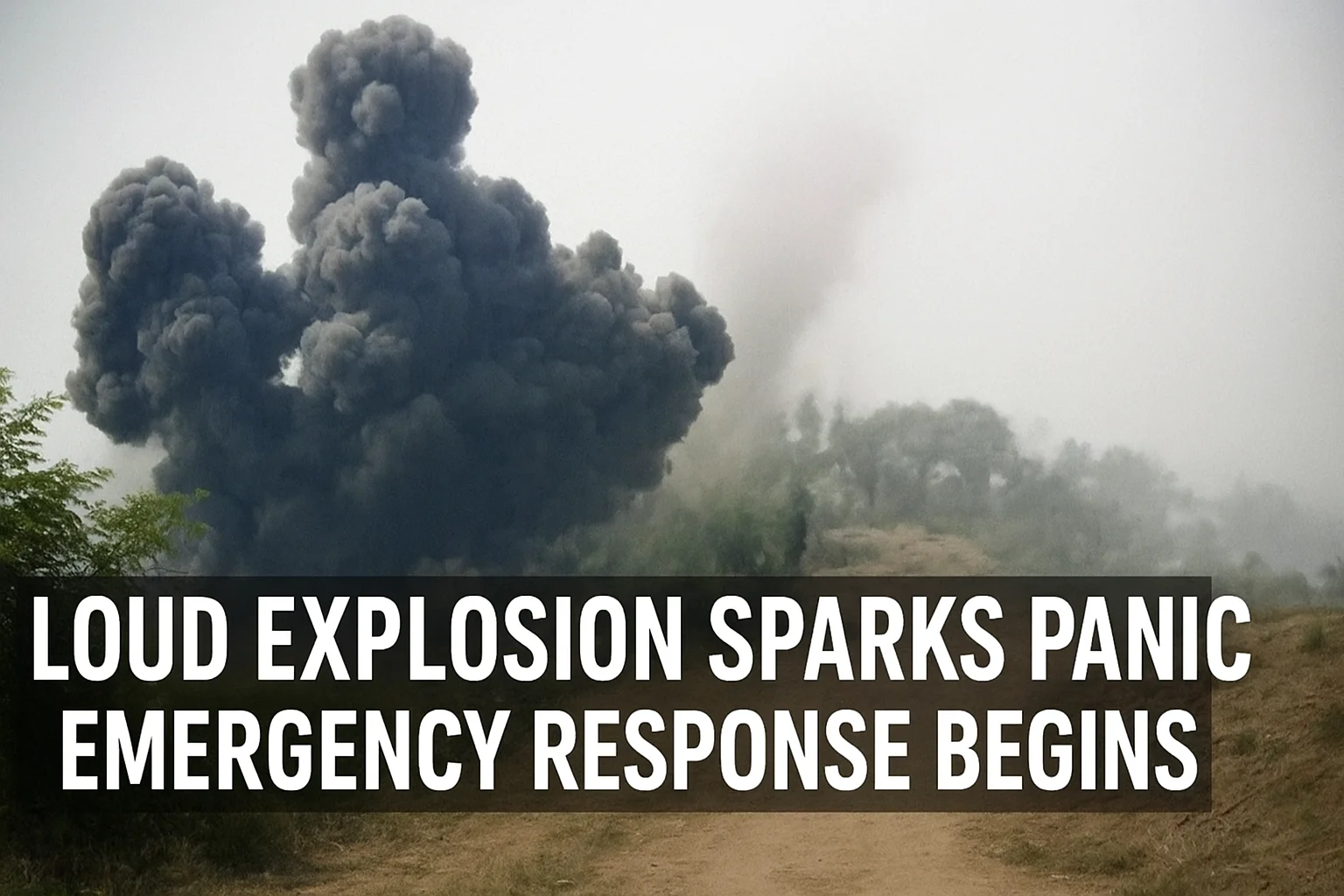Loud explosion sparks panic as smoke fills the sky. Eyewitnesses report chaos, rescue teams respond fast, and officials launch a full investigation.
A loud explosion shook the area today, sending waves of fear among local residents. The sound was so powerful that people from nearby towns also reported hearing it. Thick smoke rose high into the sky, and within seconds, people rushed out of their homes, shops, and offices to find out what had happened. Panic spread quickly, as many feared it could be a serious accident or even something more dangerous. Rescue teams reached the site immediately and started relief work. Authorities have confirmed that a full investigation is underway, but the exact cause of the blast is still unknown.
Loud Explosion Sparks Panic – Situation Overview
Eyewitnesses described the explosion as sudden and extremely loud. Some said their windows shook and walls vibrated when the blast happened. Others reported that the smoke cloud was visible from several kilometers away. Many families rushed their children out into open spaces, thinking it might be a gas leak or another chemical accident.
Emergency services sealed off the area to prevent people from getting too close. Local hospitals were put on alert in case of injuries. While no official confirmation has been given about the source of the explosion, officials are carefully examining the scene to determine whether it was caused by a gas leak, machinery failure, electrical fault, or another industrial issue.
Rescue Response and Investigation Initiation
The rescue operation was quick and organized. Firefighters, paramedics, and law enforcement reached the site within minutes. Their first step was to evacuate people from surrounding buildings and set up a safe zone. Medical teams checked for injuries, while fire crews sprayed water to control any possible flames.
Investigation officers immediately began their work. They took soil samples, documented smoke patterns, and collected broken materials that could provide evidence. Witnesses were also interviewed. Every small detail is important in such cases because it helps experts trace back the sequence of events that caused the explosion.

Technical Framework for Explosion Investigations
Explosion investigations are complex and require scientific methods. International guidelines such as NFPA 921 are widely used to ensure investigations are accurate. Experts normally follow these steps:
- Identify the point of origin.
- Look for possible fuel sources like gas, chemicals, dust, or electrical sparks.
- Analyze how the ignition happened and what caused it.
- Reconstruct the sequence of events to find the root cause.
Special tools are used to measure chemical residues, check structural damage, and test for equipment failure. Evidence is stored carefully so that results are reliable and can also be used in court if negligence is proven.
Examples of Recent Verified Explosions and Investigations
Explosions are not limited to one region—they happen in different parts of the world due to various reasons. Looking at recent examples can help understand how serious these incidents can be.
- In Nebraska, USA (2025), a plant explosion caused by wood dust killed three people, including two children. Investigators found that poor safety measures and lack of regular cleaning allowed dust to build up, which later ignited.
- In Arlington, Virginia (2025), a car explosion in a parking lot damaged several vehicles. Officials explained that the blast was caused by a fuel tank rupture, a type of explosion known as BLEVE (Boiling Liquid Expanding Vapor Explosion). Luckily, no lives were lost.
- In Pennsylvania, USA (2023), a chocolate factory exploded because of a damaged gas pipe. The explosion killed several workers and destroyed the building. Later, investigators discovered that the company had failed to maintain its pipelines and also had no gas detection system.
- In Beirut, Lebanon (2020), one of the deadliest explosions in recent history happened when over 2,700 tons of ammonium nitrate stored in a warehouse ignited. The blast killed more than 200 people, injured thousands, and damaged large parts of the city. Investigations revealed years of negligence and poor storage safety.
These examples show that explosions often result from a mix of poor safety systems, technical faults, and human error.
Preventative Measures and Safety Recommendations
Experts agree that explosions can be avoided if industries and authorities follow strict safety rules. Some of the most important measures include:
- Regular Inspections: Gas pipelines, chemical tanks, and machinery must be checked regularly for leaks, cracks, or faults.
- Detection Systems: Factories should install gas and fire detection alarms that alert workers immediately if a leak happens.
- Proper Training: Workers should be trained to handle emergencies, evacuations, and equipment failures.
- Emergency Drills: Regular drills should be conducted so people know exactly what to do if an explosion or fire occurs.
- Legal Enforcement: Governments should enforce strict laws that require companies to follow international safety standards. Companies that ignore these rules should face heavy penalties.
Forward-Looking Actions
For today’s explosion, investigators will continue their work until the cause is confirmed. The report may take weeks, as samples are tested in laboratories and equipment is analyzed. If negligence is found, legal action may be taken against those responsible.
Residents have already demanded stronger safety rules to protect their communities. Experts believe that by applying advanced technology, improving training programs, and enforcing strict safety codes, future explosions can be prevented.
Broader Global Context of Explosion Risks
Explosions are not limited to industrial plants. They can also occur in homes, markets, and transport systems. Gas cylinder leaks in kitchens, fuel tanker accidents on highways, and chemical storage issues in markets have all caused deadly blasts in different countries. This is why public awareness is just as important as industrial safety. People should know how to handle gas safely, how to identify early warning signs of leaks, and how to report hazards to authorities.
Conclusion: Loud Explosion Sparks Panic
The loud explosion that shook the area today caused panic, but the quick response of emergency services helped bring the situation under control. The investigation will reveal the exact reason, but the incident is another reminder of the importance of safety and prevention. From past global cases, it is clear that negligence, poor maintenance, and lack of safety systems often lead to disasters. Strong safety rules, modern technology, and community awareness remain the best tools to avoid such tragedies in the future.

